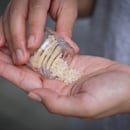
A Complementary Approach to Managing Arthritis
Arthritis is the number one cause of disability in the U.S. affecting all ages, genders, and races. Arthritis is expected to increase from 52 million cases currently to 78 million by 2040 (CDC, 2018).
The challenges to managing arthritis include maintaining the quality of life, drug side effects, and that 47% of adults with arthritis have at least one other “lifestyle disease.” Each case is unique to the individual (Centers for Disease Control & Prevention (CDC), 2018).
The allopathic approach to managing arthritis focuses on symptom management and immune system modification using non-steroidal anti-inflammatories (NSAID), pain relievers, corticosteroids, disease-modifying anti-rheumatic drugs (DMARD), and biologics. These drugs increase the risk for heart disease, immune suppression, lymphomas, and impairment of kidney and liver function; among other side effects.
Taking a holistic approach, inclusive of diet, exercise, medication, stress reduction, medication, and natural supplements provide the practitioner and patient with an arsenal of complementary tools to manage arthritis.
Diet and Digestive Health
Critical to managing the inflammatory and immune components of arthritis. Diets high in refined sugar, processed foods, high insulin stimulating diets, factory-farmed fish and confined animal feeding operation’s meats, hydrogenated fats and oils, excessive omega-6 and too little omega-3, as well as reactive proteins such as gluten, dairy, and processed soy, can leaded to local and systemic inflammation.
Reducing the foods mentioned above; while increasing the amount of omega-3 rich foods (wild caught fish, flax seeds, chia seeds, walnuts, grass-fed meats), vegetables and fruits, healthy fats and oils (omega 3 fatty acids, coconut oil, avocado, nut oils, olive oil), along with spices including ginger and turmeric can provide a low inflammation response (Harvard, 2014).
Exercise and Relaxation
Balance is essential because our bodies are designed to handle exercise and stress in acute short terms, with periods of rest and repair. Continuous exercise or a sedentary lifestyle and chronic stress can lead to prolonged inflammation and immune system impairment. Finding the balance is key (Sisson, 2012 & Falconer, 2012).
Supplements
Providing targeted anti-inflammatory support, immune modulation, as well as other benefits will be discussed.
- Vitamin D provides support for bone, breast, prostate, cardiovascular, colon, cognitive, immune health, and inflammation. Vitamin D has been shown to benefit patients deficient in Vitamin D by influencing the inflammatory markers.
- Increasing interleukin 10 an inflammatory cytokine (IF-10)
- Reducing interleukin 6 an inflammatory cytokine (IL-6)
- Preventing further increase of Tumor Necrosis Factor (TNF)
(Yusupov 2010)
- Curcumin which is derived from turmeric has been shown to support healthy inflammatory balance, immune modulation, and other benefits including digestive, cardiovascular, cognitive, liver, and kidney support. Curcumin has been shown to reduce C-Reactive Protein, erythrocyte sedimentation rate (ESR,) IL-6, and TNF.
- Dosages vary depending on the level of bioavailability of the formulation and patient condition
- Ranging from 250 mg to over 3000 mg daily
- Dosages vary depending on the level of bioavailability of the formulation and patient condition
- Boswellia has shown digestive, immune support, and anti-inflammatory benefits by reducing CRP, ESR, and IL-6. Boswellia supports structural integrity, mobility, and comfort of joint cartilage while inhibiting the cartilage
the degrading enzyme, matrix metalloproteinase (MMP-3.)- Dosages vary dependent on the levels of bioavailability and bioactivity
- Recommended: an AKBA (active ingredient)-rich boswellia product
- Dosages vary dependent on the levels of bioavailability and bioactivity
The results of a study of osteoarthritis patients in which one group received celecoxib 100 mg twice daily and the other group received a combination of curcumin and boswellia, 500 mg twice daily showed that after 4 months the majority of patients taking celecoxib reported more pain, and were unable to walk 1,000 meters as compared to the herbal group. Additionally, the herbal group’s liver and kidney blood tests showed none of the adverse effects associated with NSAID (Antony, 2011).
- Undenatured Collagen (UC-II) has shown to be effective in promoting joint flexibility and comfort and regulating the immune system by preventing immune cells from overreacting and attacking proteins normally found in cartilage and joint tissue.
- Standardized dose: 40 mg/day
- Fun fact: The benefits of UC-II were discovered when arthritis subjects ate chicken soup!
The researchers concluded that the collagen from the chicken bones triggered a process known as specific oral tolerance, where killer T-cells would be “re-trained” to treat the body’s own collagen as harmless, thus preventing joint destruction (Rennard, Ertl, Gossman, Robbins, & Rennard, 2000).
The management of arthritis with natural medicine offers many clinical and outcome-based solutions. Natural medicine is core to the pharmaceutical profession, offering integrative solutions through age old wisdom and modern-day discoveries.
References
Antony, C.A., Kizhakkedath, R., Benny, M., Kuruvilla. B. (2011) Clinical Evaluation of an Herbal Formulation in the Management of Knee Osteoarthritis. Poster presentation at the Osteoarthritis Research Symposium Internationale (OARSI) Annual World Congress on Osteoarthritis.
Centers for Disease Control [CDC] (2018) Arthritis-Related Statistics. Retrieved from: Centers for Disease Control Falconer, C.L., Cooper, A.R., Walhin, J.P., Thompson, D., Page, A.S., Peters, T.J., Montgomery, A.A., Sharp, D.J., Davan, C.M., Andrews, R.C. (2014) Sedentary time and markets of inflammation in people with newly diagnosed type 2 diabetes. Nutrition, Metabolism and Cardiovascular Disease. 24(9): 956–962.
Harvard University (2014) Foods that fight Inflammation. Retrieved from: Harvard University
Rennard, BO., Ertl, RF., Gossman, GL., Robbins, RA., Rennard, SI. (2000) Chicken soup inhibits neutrophil chemotaxis in vitro. Chest.118(4):1150-7.
Sisson, M. (2012) The Relationship Between Exercise and Inflammation. Retrieved from: The Relationship Between Exercise and Inflammation
Yusupov, E. (2010) Clinical Study Vitamin D and Serum Cytokines in a Randomized Clinical Trial. Retrieved from: Clinical Study Vitamin D and Serum Cytokines in a Randomized Clinical Trial




